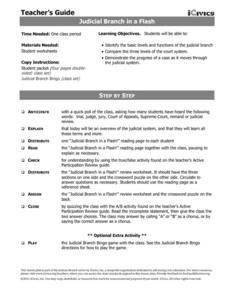Center for Civic Education
Women's History Month Word Clouds
What a great idea for celebrating Women's History Month and discovering the amazing efforts that individuals have put forth on behalf of women's rights! Learners take a closer look at the speeches and other primary source documents of...
Center for Civic Education
The Power of Nonviolence: The Children's March
What was the Children's Crusade and how did it impact the civil rights movement in the United States? Your young learners will learn about this incredible event through a variety of instructional activities, from reading a poem and...
Center for Civic Education
The Power of Nonviolence: What Is Nonviolence? What Does It Cost?
Your young learners will delve into the language of primary source documents in order to identify the characteristics, benefits, and costs of nonviolence. The lesson includes a mix of activities, including an anticipatory activity,...
Judicial Branch of California
Separate But Equal - Is It Black or White?
The story of Ruby Bridges and the case of Brown vs. The Board of Education are fantastic tools for discussing the concept of separate but equal. Kids tackle some big questions about what is fair, what is civil, and what rights or laws...
iCivics
The “Supreme” in Supreme Court
Does a public school have the right to restrict what t-shirts students wear? Discover what happened when this question was brought to the Supreme Court, and review other major cases in United States history involving judicial review....
iCivics
Taxation
A paycheck stub can offer loads of information on the taxes American citizens pay. This resource not only includes analysis of a stub as an activity, but also provides a wealth of informative reading material on such topics as the...
iCivics
Propaganda: What’s the Message?
As class members progress through eight fully prepared learning stations, they will identify how bias is present in persuasive media, as well as differentiate among types of propaganda techniques like bandwagon propaganda and the use of...
PBS
President Theodore Roosevelt: Foreign Policy Statesman or Bully?
Can a negative perception of a president's foreign policy harm his or her historical legacy? A project that winds the clock back to the date of Theodore Roosevelt's death puts students at the editorial desk of a fictional newspaper....
Curated OER
Concept Formation Lesson Plan: Understanding "Protest"
After analyzing both examples and non-examples of a variety of protests conducted by ethnic groups in Seattle and the state of Washington during the twentieth century, your class members will work to identify the key ideas and components...
iCivics
We the Jury
Learners take on the roles of jurors in a civil case to evaluate evidence and determine a verdict in this engaging online interactive experience.
US Citizenship and Immigration Services
Thanksgiving 1—Pilgrims and American Indians
The Pilgrims first arrived in America in order to gain religious freedom. Here is a lesson that takes the class on this journey with the Pilgrims, stopping to look at how they got here, who they met when they arrived, and a peek into...
Center for Civic Education
What Is Authority?
Young scholars examine the concepts of power and authority as they begin learning about government in this elementary social studies lesson. Through a series of readings, discussions, and problem solving activities, children learn about...
Curated OER
What is the Federal System Created by the Constitution?
Explore the unique structure of the federal system of government in the United States. Class members will learn about how most nations were organized before the establishment of the Constitution, how power is currently divided between...
What So Proudly We Hail
Life, Liberty, and the Pursuit of Happiness: A Lesson on the Declaration of Independence
What does it mean to say that a right is unalienable? How did the founding fathers convey this revolutionary concept in the Declaration of Independence? Engage in a close reading and analysis of the Declaration of Independence, and...
iCivics
Wanted: A Just Right Government
What type of government did American colonists gain and seek after gaining their independence after the Revolutionary War? Here is lesson that will guide your young learners through the new nation's progression from the Articles of...
iCivics
Judicial Branch in a Flash
What is the difference between the federal court and state court systems? What about criminal versus civil cases? Check out this resource that will offer your class members a general and effective overview of the judicial branch in the...
iCivics
So You Think You Can Argue
What defines an argument, and how can someone properly formulate a counterargument? This resource provides two options—an interactive PowerPoint presentation or worksheet—that will support your learners as they begin to explore how to...
iCivics
Yeah, But...
Impress upon your young learners the importance of formulating counter arguments based on facts and not opinions. This resource is meant to strengthen arguments designed in a previous lesson, but could also be used as a stand-alone...
iCivics
Emphasize Minimize
Encourage your class members to consider what points they are really emphasizing when they are making an argument, whether in writing or in speech. Watch out though, as this lesson may just leave your learners eager to debate you!
iCivics
Foreign Policy: War
What is the difference between foreign and domestic policy? What are the primary differences in what the United States hopes to accomplish through foreign aid, the military, and the creation of treaties? Your class members will examine...
iCivics
No Rambling Allowed
What makes for a strong persuasive argument? Organization! After deconstructing a sample argument and then following the guidelines of an included worksheet, your class members will learn how evidence can be organized in order to produce...
iCivics
Voting in Congress
In a role-play activity acting as members of either the Senate or House of Representatives, class members will vote on bills to halt mail delivery on Saturdays in the United States and to raise the minimum wage. Through an included...
iCivics
Students, Engage!
Discuss as a class some problems that you would like to see changed in your school or community, and then take action! After your young citizens determine the appropriate steps they should take to accomplish their objectives, they will...
iCivics
Conflict & Cooperation
Considering such conflicts as the Vietnam War and the war in Afghanistan, what motivates nations to cooperate? Your class members will analyze past and current international events in order to understand the types of conditions and...
Other popular searches
- Civic Responsibility
- Civic Education
- Civics and Economics
- Civic Virtue
- Introduction to Civics
- Social Studies Civics
- Civics Political Cartoons
- Civics Project
- Civic Values
- Civics Lesson Plans
- Civic Activism
- American Civics

























